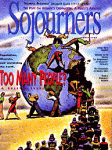A historian looks for facts, while a novelist probes for the hidden truth of a story. In her non-fiction novel about Dietrich Bonhoeffer’s resistance to Hitler, Mary Glazener incorporates elements of both disciplines, but the historian dominates.
Based on more than 10 years of research, The Cup of Wrath is a compelling story of the young German theologian’s courageous attempt to be faithful to God during Hitler’s repressive regime. The question Bonhoeffer struggled with was one many face today, though for us it’s mostly theoretical: How do you resist evil as a Christian without disobeying Christ’s commands to act nonviolently?
The irony of Bonhoeffer’s witness is that he was almost alone among contemporary Lutherans in his pacifism, yet he felt compelled to take part in a plot to overthrow Adolf Hitler, a plot that developed into an attempt to assassinate the self-proclaimed Fuhrer.
You can read this book as an apology directed at those who glibly criticize Bonhoeffer for dropping his pacifist beliefs and acting violently. Glazener shows both the overwhelming evil of Hitler’s regime and the agonizing process of Bonhoeffer’s decision to take action to stop evil instead of separating himself from the problem in order to remain pure.
Bonhoeffer spent some time in the United States before the war. Paul Lehmann of Elmhurst College tried to talk him into staying instead of returning to Germany. Lehmann asks, "Isn’t what you have to say more important than what you might do in the conflict at home?" Bonhoeffer replies, "No. If I stayed here and war came, I’d have nothing to say. I would have compromised my witness."
Glazener's offering is a helpful corrective to a superficial understanding of Bonhoeffer’s dilemma. However, she overdoes defending his choice. The long pieces of dialogue she creates often sound contrived, more like polished classroom debate than actual conversations. Bonhoeffer’s actions speak louder than the words she puts in his mouth.
For the most part, though, the author sticks with the story, which is so engrossing you’ll not want to put the book down. And the many knowing details Glazener includes reinforce the narrative’s realism. She knows what things cost, what people ate, what they wore, what the weather was like. For example, a few days before Hitler’s assault on Poland, the book notes, "There was no rain and the unpaved Polish roads stayed hard and smooth. People called it ‘Hitler weather.’"
But while such details are helpful, Glazener succumbs to the historian’s temptation to include too many, and the narrative at times loses its focus. A good editor could have made this a shorter, even more compelling book.
The Cup of Wrath does not display the polish or the power of a good novel. Some of the dialogue, especially that between Dietrich and Maria, his fiancee, rings false. There are places where the narrative voice loses its objectivity, for instance where an SS officer is referred to as "a jackal in a gray suit."
At times the book reads like hagiography, especially in the recounting of Bonhoeffer’s last hours before being hung by the Nazis on April 9, 1945. And while telling the story in the form of the novel makes it much more accessible and more interesting, you’re left wondering how much of what is told is documented and how much comes from the author’s imagination. You come away wishing for some kinds of annotation of Glazener’s research.
This is an important book because it reveals what life was like in Nazi Germany for those Germans who opposed Hitler, many of whom paid for their stance with their lives. And it tells the story of a courageous witness, one we all would do well to listen to and learn from.
The Cup of Wrath. By Mary Glazener. Smyth & Helwys, 1992.

Got something to say about what you're reading? We value your feedback!